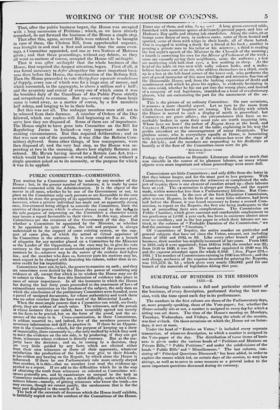Commissions are little Committees ; and only differ from the
latter in that they labour longer, and for the most part to less purpose. With Committees, however numerous the witnesses or complicated the sub- ject of inquiry, there is one element of comfort mixed up—their labours have an end. The ( x imination is always got through, and the report made, within somewhat less than a Parliamentary lifetime. But Com- missions are eternal. In the case of the Irish Education Commission, after sixteen Reports, in the form of as many folio volumes, had been laid before the House, it was found necessary to frame a second Com- mission, to report on the Reports, the first one being inadequate to the task of unravelling their own complications. The Commission on Public Charities, which gives constant and comfortable employment to ten gentlemen at 1,C00/. a year each, has been in existence almost since ever we recollect ; and in the last paper in which their labours are no- ticed, in the column of "Probable Duration of the Commission," we find the ominous word "Uncertain."
Of Committees of Inquiry, the entire number on particular and general subjects that have sat since the Union, amount, not including those of 1831 and 1832, to 83. Like every other branch of public business, their number has mightily increased of late years. From 1801 to 1810, only 3 were appointed; from 1810 to 1820, the number was 22; from 1820 to 1830, it was 58. The number appointed in 1830 was 10, and the expense attendant upon the whole 6,104/. [Seas. Paper 273- 1831.] The number of Commissions existing in 1830 was fifteen ; and the nett charge, exclusive of the expense incurred for printing the Reports, was 113,517/. 2s. 7d. ; which gives very nearly 120,000/. paid for one branch of the materials of legislation during that year.


















































 Previous page
Previous page